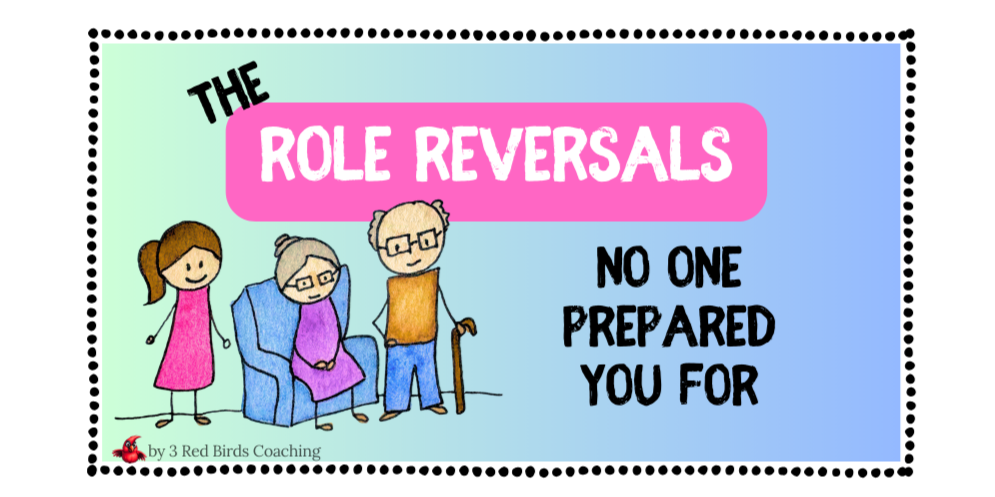The Role Reversals No One Prepared You For
Without Warning - When the Roles Reverse
I had no idea what it would feel like—the child becoming the caretaker for the very people I had always looked to as my safe keepers. Even though both my parents are gone now, I still struggle to fully grasp the quiet, gradual shift that took place—sneaking up without warning and soon consuming every waking moment.
Caregiving for our parents isn’t exactly a taboo topic, yet it’s rarely discussed until it becomes your reality. It begins subtly: a few doctor appointments here, preparing a meal or two there. Then, before you know it, you’re managing every appointment, making decisions that were never yours to make, and offering the emotional support and reassurance you once received.
The emotional weight of that transition is hard to capture in words. It just… happens.
Waking Up To The Truth
This is where awareness becomes absolutely essential. You have to allow yourself to feel everything that rises to the surface. I didn’t do this and by failing to be real with myself, I harbored much more intense emotions that began to boil over and show themselves in ways I couldn’t see or understand. I was dodging all the emotions that were coming up, foolishly thinking they were just temporary. I beg of you to let those emotions be seen! The truth is, the more you try to push them down, the louder they become. Avoidance doesn’t make them disappear — it magnifies the stress, quietly and relentlessly.
What takes the biggest toll isn’t just the physical tasks—cleaning the house, preparing meals, sitting through Netflix episodes with your aging parent. It’s the emotional weight that often goes unspoken. That shift from child to caregiver happens quietly, but its impact is powerful.
These hidden emotions are rarely comfortable. Some are deeply painful. Bitterness. Frustration. Anger. Resentment. Guilt. Not directed at your loved one — but at the situation. At how unfair and unrelenting it can feel.
No one hesitates to talk about the arrival of a newborn as a major life transition. We prepare for it. We surround it with celebration and support. But at the other end of the life continuum, when the roles reverse and you're suddenly caring for the one who once cared for you, there’s so little conversation. So little guidance. You’re left to navigate a journey that feels impossible to prepare for — emotionally, mentally, spiritually.
You watch someone you’ve looked up to your entire life — the one who appeared invincible — but now, you see weakness and fragility. Maybe they can’t walk, or bathe, or feed themselves anymore. And it shakes something in you that words can’t quite describe.
The most agonizing part? There is nothing you can do to stop time. No fix. No pause button.
So how do you make peace with that?
How do you hold space for the deepest love you’ve ever known… while also learning how to let go?
The Psychology of Role Reversal
Research from the Journal of Aging Studies highlights how adult children experience complex emotions during this reversal—ranging from guilt, anxiety, and anticipatory grief to empowerment and even pride. The psychological term “parentification” is often used when roles reverse in childhood, but even in adulthood, taking on caregiving responsibilities for a parent can lead to stress and identity confusion.
Dr. Pauline Boss, a leading expert on ambiguous loss, says, “When a loved one is physically present but psychologically changed, we experience a form of grief that has no closure.” This type of grief is real. It comes in the quiet moments—watching your father struggle with his zipper or hearing your mother forget your name. Its grief mixed with loyalty, frustration, mixed with love.
What No One Sees ~ The Emotional Layers
What makes this so challenging is the emotional layering:
You are simultaneously their child and their advocate.
You carry your memories of who they were while navigating who they are now.
You mourn what’s lost and feel guilt for the resentment that sometimes bubbles up.
I’ve felt all of it. The exhaustion. The sacredness. The pressure. The love.
What Can I Do With All This Uncertainty?
While we can’t change our parents' aging, we can change how we walk with them. With compassion. With boundaries. With presence.
I share this with you from a place of reflection and deep humility. I had the sacred privilege of walking alongside both of my parents as they made their way home. And looking back, I can honestly say, I cared for them with every bit of love and effort I had. I did the best I could with what I knew at the time.
But if I’m honest, there’s an ache in my heart when I think about how often I resisted allowing myself to feel everything as it was unfolding. That resistance, though unintentional, sometimes showed up as frustration instead of patience, sharpness instead of softness, bitterness instead of compassion.
I can’t go back and change those moments. But I can offer you this, if you’re in the middle of this journey now — allow yourself to feel everything. If you’re angry, frustrated, overwhelmed, it’s okay. You’re human. Let it be expressed in healthy ways. Resist the temptation to bury it. What you don’t release, builds up and it truly becomes a burden to carry. It will leak out in ways that don’t reflect the love you truly want to give, to those you care for or to yourself.
The time we have with those we love is limited and precious. Let your heart lead. Let the love be louder than the pain.
Finding Meaning in the Shift
This transition isn't just about caregiving. It’s about growing into a version of yourself that you didn’t expect or even know existed. It's about love deepening in unspoken ways. It’s about honoring the past, navigating the present, and preparing to let go. Allow yourself to reflect on where you may be carrying resentment and where you may need to find more compassion for both yourself and those you’re caring for
Let yourself feel it all and share with those who support you. Acknowledge that there is no shame in giving a voice to whatever you are experiencing. YOU’RE NOT ALONE. It’s okay to grieve, to laugh, to get frustrated, to feel resentment, to feel broken … to just simply feel.


